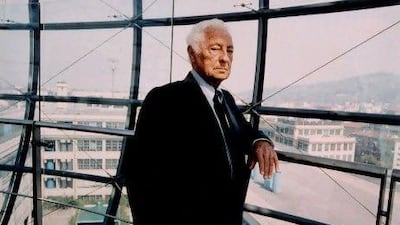In school I was taught that Italy is a republic but in the last quarter of the 20th century it had an undisputed king. One of the most powerful un-elected figures in the post-war world, Gianni Agnelli, head of the Fiat empire, saw Italy as his domain and Europe as his playground. This regal "Rake of the Riviera" forged modern Italy by turning Fiat into the industrial giant of the continent and still found time to become an international style icon.
Inheriting Fiat from his grandfather in 1966 at the age of 41, he turned around its ailing fortunes to claim 20 per cent of European market share within three years before expanding into South America and Soviet Russia and bringing Ferrari, Lancia and Alfa Romeo under his control. By far the largest employer in Italy and controlling 4.4 per cent of its GDP, Agnelli had unparalleled influence. Add to this a $2 billion (Dh7.3bn) fortune, Juventus Football Club, his own ski resort and control of two newspapers and it is easy to understand how he acquired an almost mythical status.
A trusted ally to a succession of presidents, Agnelli and Fiat were virtually above the law. His interests were considered to be national interests and a web of bribery helped ensure that with a single phone call he could walk roughshod over labour laws and demand import restrictions on foreign competitors who may have challenged his supremacy. His death in 2003 was greeted with national mourning usually reserved for monarchs and statesmen, with the Pope acknowledging his pre-eminent role in the making of modern Italy. The flags at Fiat factories and offices across Europe were at half mast to mark the passing of one of the most powerful motoring moguls of them all.
Sent for an apprenticeship with Henry Ford, a family friend, after graduation, Agnelli was groomed to inherit the Fiat empire from a young age. But he would be into his fourth decade before he assumed power. As a young man he enlisted in the army in 1941, where he drove Fiat armoured cars in North Africa, before settling down to a life of riches and revelry with the luxury of an annual $1 million (Dh3.7m) allowance. He hosted legendary parties in his Cote D'Azur villa and was spotted at celebrity nightspots with friends that included the Kennedys and the dashing Errol Flynn. Despite a contented marriage he earned an international reputation as a playboy, seducing a string of sirens including the sultry Swede Anita Ekberg.
Taking great care in his appearance, he became a symbol of sartorial style and was recently ranked the fifth best-dressed man in the history of the world by Esquire magazine. His trademarks were bespoke Italian suits and wearing his watch over his cuff.
But despite his celebrity and couture lifestyle, he never took his foot off the pedal in his principal aim. He expanded the Fiat range considerably and, when necessary, took daring decisions to protect his inheritance, such as his controversial sale of a 10 per cent stake in the company to Libyan ruler Colonel Qaddafi to help ride out the oil crisis of the early 1970s. It took a man of great conviction and no little inspiration to outwit and outsell Volkswagen in an increasingly competitive and cut-throat market. Whenever Fiat seemed vulnerable he found a solution, such as the release of the best-selling Uno supermini in the 1980s.
As with many of his forebears and rivals, Agnelli had to manage tensions with his labour force. In Italy, trade unionism was militant and several Fiat executives were murdered by the communist Red Brigades. Agnelli as the principal target had to be escorted by bodyguards and carried a cyanide pill in case of abduction. But his courage in facing this threat and his at times ruthless suppression of strikes has led some historians to credit him with saving Italy from communism. His grandfather and namesake, a close friend of Benito Mussolini, would have been proud.
Three years before his own death, tragedy struck with the suicide of his only son and heir, Edoardo, an insecure misanthrope who struggled to cope with the pressure of his surname. Fiat was passed on instead to Agnelli's grandson, John Elkann, and remains the largest corporation in Italy.
A certain generation of motor enthusiasts still believe that Fiat translates into English as "rust" but nothing can corrode the reputation of one of the automobile industry's most charismatic moguls.

